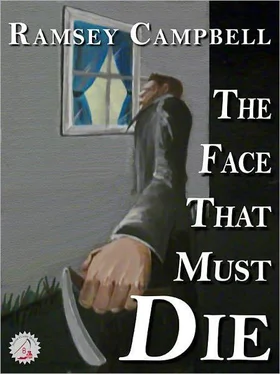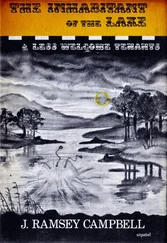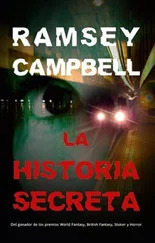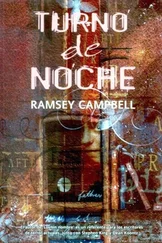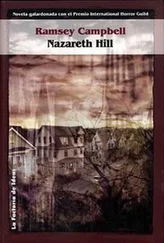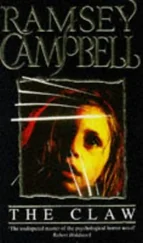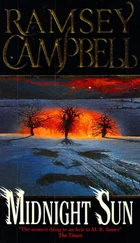Ramsey Campbell - The Face That Must Die
Здесь есть возможность читать онлайн «Ramsey Campbell - The Face That Must Die» весь текст электронной книги совершенно бесплатно (целиком полную версию без сокращений). В некоторых случаях можно слушать аудио, скачать через торрент в формате fb2 и присутствует краткое содержание. Жанр: Триллер, на английском языке. Описание произведения, (предисловие) а так же отзывы посетителей доступны на портале библиотеки ЛибКат.
- Название:The Face That Must Die
- Автор:
- Жанр:
- Год:неизвестен
- ISBN:нет данных
- Рейтинг книги:4 / 5. Голосов: 1
-
Избранное:Добавить в избранное
- Отзывы:
-
Ваша оценка:
- 80
- 1
- 2
- 3
- 4
- 5
The Face That Must Die: краткое содержание, описание и аннотация
Предлагаем к чтению аннотацию, описание, краткое содержание или предисловие (зависит от того, что написал сам автор книги «The Face That Must Die»). Если вы не нашли необходимую информацию о книге — напишите в комментариях, мы постараемся отыскать её.
The Face That Must Die — читать онлайн бесплатно полную книгу (весь текст) целиком
Ниже представлен текст книги, разбитый по страницам. Система сохранения места последней прочитанной страницы, позволяет с удобством читать онлайн бесплатно книгу «The Face That Must Die», без необходимости каждый раз заново искать на чём Вы остановились. Поставьте закладку, и сможете в любой момент перейти на страницу, на которой закончили чтение.
Интервал:
Закладка:
His bright quick eyes fixed her. “Is that all he told you?”
“ Just about the police. Why, is there something else?”
His lips grew thin, reproving her. “I’m sorry,” she said. “Of course you mustn’t tell me. It’s just that this whole affair has been worrying me too. Roy thinks someone in the house was responsible. You don’t think that, do you?”
He gazed at her. After a while he said “Yes, I’m afraid someone in this building is definitely implicated.”
She stared depressed into her tea. Its whirling, a roulette of bubbles, slowed. She felt that ill luck and viciousness had invaded the house. She couldn’t control her suspicions: the culprit must be the almost invisible man on the ground floor, The Bell With No Name. The names she and Cathy had given him didn’t seem so funny now.
The detective finished his tea and handed her the cup. “I’ll tell Roy you were here, shall I?” she said.
At once his hand burrowed into his pocket. He must be making sure he hadn’t forgotten his notebook again. “Look,” he said abruptly, “I’d like to ask a favour of you. I shouldn’t really have told you as much as I have. Would you mind not mentioning you saw me?”
It might lose him his assignment, at that. No doubt his faded overcoat was only a kind of disguise, but at that moment it made him look rather pitiful, vulnerable. “It was my fault,” she said. “I wouldn’t let you out of the porch. All right, I promise I won’t tell him.”
She watched him down the stairs. Now the slowness of his walk looked triumphant, a march. Before closing the front door he glanced up at her. “Thank you for everything,” he called.
Chapter X
Horridge closed the dictionary and gazed at it as though it were a treasure chest. Around him people searched the library shelves for adventure, horror, romance, crime. None of them was aware of his triumph. He sat gazing out at Cantril Farm, smiling to himself.
The dictionary gave only one definition of “fanny”: buttocks. That in itself showed how corrupt the painter was, to change her name to that – corrupted by Craig, perhaps. But the next entry in the dictionary was even more suggestive. Fanny Adams had been a girl murdered and cut up in 1812. Could any other coincidence have linked the painter to Craig so closely? Why, if you looked at it correctly, it even confirmed that Craig was the killer.
Not that confirmation was needed. Once again the creature had betrayed himself by silence: he hadn’t told the woman about Horridge’s phone calls. So she wasn’t wholly in his confidence – but that didn’t make her any less contemptible. No pang of sympathy for her would distract Horridge from what he planned to do.
He’d seen at once what kind of woman she was, with her face made up to look younger than forty, her oversized earrings that looked rusted by her red hair, her blouse flamboyant as a scrawled wall: a woman with no taste or breeding. Everything had confirmed his first impression: the audience she boasted of wanting to reach, the shirking class; her outrage that poor defenceless Craig was being made to see what people thought of him; her painting itself, all that modern rubbish – it was entirely typical that she couldn’t even describe people when asked. Of course that was something he could be thankful for.
Most inexcusable of all had been her suggestion that he was a friend of Craig’s – though he was grudgingly grateful to her for telling him that he was a detective. She’d seemed almost eager to help him triumph. He’d enjoyed few things so much as deluding her. Everything had been on his side, for a change. After his ruse in her flat, he felt sure of victory.
Now he must visit old Mr Fearon. Suppose Mr Fearon was dead? It had been years since Horridge had seen him. Still, he felt too justified to believe he would be thwarted now. He returned the dictionary to its shelf, patting its spine gratefully, and left.
He’d learned Mr Fearon’s address by heart the day he had met the old man in the L-shaped street of shops and recognised him from years ago in Boaler Street. He knew nobody else in Cantril Farm. He’d clung to that knowledge in case he ever needed it.
Passing buses marked the main road. When he headed for it, buildings constantly blocked his way. Beside the path, grassed patches were sown with broken glass. He read the names on the blocks of flats and houses: Cremorne Hey, Boode Croft, Custley Hey. What kind of language was that? Were they trying to get rid of English?
Now he could see his destination, on the far side of the main road. He couldn’t go straight to it, though a path led across grass to a gap in the railings. He’d been tricked by these paths before: they led you onto the main road and abandoned you there, on the wrong side of the railings, without a pavement. Sometimes he thought that the planners had faked those paths to teach people to obey without questioning.
He had to follow the walkway, a dried-up valley of concrete which plunged beneath the road. The tunnel was treacherous with mud and litter; the walls were untidy webs of graffiti. All the overhead lights had been ripped out. He stumbled through, holding his breath; the place smelled like an open sewer.
On the far side he clambered up concrete steps. Fragments of glass squeaked and cracked underfoot. Nearly there now. But did the name on the wall before him refer to the entire block? And where was 81?
He hurried beside the pebble-dashed wall, past displayed rooms. He peered through passages that opened between flats. There it was, at the far side of an inner square of concrete: an L-shaped flat, exposed at both ends by passages. Once before he’d found himself on this side of the main road, and had determined to see where Mr Fearon lived. The location reminded him of his own.
He made for the flat. Somewhere there was a faint metallic screeching. He was beneath the concrete stairway to the upper flat, and ready to knock on the door, before he saw that this wasn’t 81 at all. He recoiled, disoriented. Then he saw that the corners of the square were identical. He’d simply mistaken the corner – but none of the flats was 81.
He could feel his nerves tightening like a net. Had he come too far, beyond the territory whose name he’d read on the wall? There must be dozens of places in the concrete maze that looked just like 81. A dread which he’d tried to suppress was creeping into his thoughts – that sometime, perhaps in fog, he would come home and be unable to distinguish his own flat.
Anonymity surrounded him. The muffled screeching persisted, scraping at his nerves. That was the only sign of life here: the voice of a machine. What kind of machine? A bacon-slicer – no, not quite. Suddenly he remembered that he’d heard such a sound on Boaler Street, in Mr Fearon’s shop.
He limped towards the sound. Beyond one passage was a square, which seemed indistinguishable from the square he was leaving. From a corner flat came the screeching. He had to approach close before he could read the number, on an oval plaque smaller than an egg: 81. He hadn’t strayed from the right path for long.
He knocked, knocked louder. The screeching faltered, and failed. After a while the blue flowers on the plastic curtains stirred, and an old face peered between them. The flowers sagged back into place; the face reappeared, blurred and surrounded by separated blobs of its flesh, in the frosted glass of the door. At last the door opened.
The old man gripped the doorframe, both barring the way and supporting himself, and glared a challenge. Did he think Horridge was a complaining neighbour? He was silent for so long that Horridge wasn’t sure he recognised him. Could this face really have been Mr Fearon’s before it had shrunken inwards so? Then the old man said “You’re Frank Horridge’s son.”
Читать дальшеИнтервал:
Закладка:
Похожие книги на «The Face That Must Die»
Представляем Вашему вниманию похожие книги на «The Face That Must Die» списком для выбора. Мы отобрали схожую по названию и смыслу литературу в надежде предоставить читателям больше вариантов отыскать новые, интересные, ещё непрочитанные произведения.
Обсуждение, отзывы о книге «The Face That Must Die» и просто собственные мнения читателей. Оставьте ваши комментарии, напишите, что Вы думаете о произведении, его смысле или главных героях. Укажите что конкретно понравилось, а что нет, и почему Вы так считаете.
